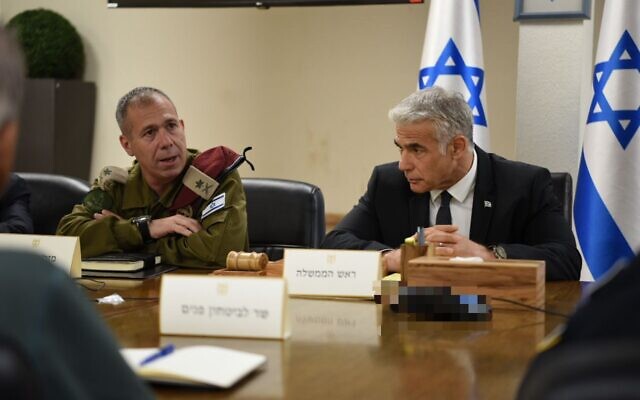Some members of the high-level security cabinet allege they were kept in the dark about Israel’s military operation in the Gaza Strip over the weekend, denying a claim by the Prime Minister’s Office that they were forewarned, according to a report Tuesday.
The Israel Defense Forces launched strikes Friday afternoon that killed Tayseer Jabari, Palestinian Islamic Jihad’s commander in northern Gaza, alleging the terror group planned to imminently carry out an anti-tank missile tank on Israeli civilians or troops along the border.
The strikes kicked off three days of fighting, before an Egyptian-brokered ceasefire came into force Sunday night.
Citing several unnamed ministers, the Ynet news site said that Prime Minister Yair Lapid’s military secretary, Brig. Gen. Avi Gil, phoned members of the security cabinet Friday morning to say that road closures and other security measures in the Gaza border area were expected to continue. The restrictions had been in place for days due to concerns that Islamic Jihad would retaliate for the arrest of its West Bank leader earlier in the week.
One of the ministers recalled Gil saying the security measures were not expected to last much longer, while others said he did not explicitly mention the pending Israeli operation but hinted something would happen.
Get The Times of Israel's Daily Edition by email and never miss our top stories
“The military secretary did not say anything about the operation, assassination or activity. Absolutely nothing,” a minister was quoted as saying.
“Maybe they expected that if they say the south is under lockdown because [PIJ] is about to carry out an attack, it should be understood that Israel is embarking on an operation, but that was not at all clear,” the minister added.
Lapid’s office pushed back against the criticism, insisting that Gil told ministers an operation was expected. It acknowledged, though, that Gil did not provide details in order to keep the operation secret, the news site reported.

Prime Minister Yair Lapid (right) holds an assessment with military and security officials at the IDF’s headquarters in Tel Aviv, August 7, 2022. On the left is Brig. Gen. Avi Gil, Lapid’s military secretary. (Kobi Elkatzur/GPO)
Also Tuesday, Attorney General Gali Baharav-Miara said she gave Lapid the go-ahead to carry out the killing of a Palestinian Islamic Jihad leader without convening the security cabinet because she was assured the act would not lead to war.
Under Israeli law, any decision to launch a war or major military operation that “is almost certain” to cause a war must be approved the security cabinet.
In response to a question from Channel 12 news as to why she did not insist the cabinet be convened in this case, Baharav-Miara said that the security establishment had assured her the strike would not lead to war, so it was not necessary to convene the top-level security body.
Baharav-Miara noted that every case was judged individually.
“In this case, given the intelligence information assessment meetings, the professional security officials unanimously said that the military action that had been decided on given the circumstances was not a military action that could lead to war,” she said.
“Given the professional assessment, the judicial decision was made,” she added.
In 2019, former prime minister Benjamin Netanyahu pressed to kill PIJ’s then-commander in northern Gaza after rockets fired by the terror group forced him off stage at a campaign event in Ashdod, but was told by Baharav-Maria’s predecessor that the move required security cabinet approval.

Attorney General Gali Baharav-Miara at the Supreme Court in Jerusalem, May 29, 2022. (Yonatan Sindel/Flash90)
Along with Jabari, Israeli forces also killed Khaled Mansour, PIJ’s commander in southern Gaza, during the flareup.
Over the three days of fighting, the IDF struck 170 targets, using fighter jets, armed drones, combat helicopters, and artillery, the military said in a briefing.
In total over the three days, 1,175 rockets and mortars were launched from the Gaza Strip at Israel. The Iron Dome anti-rocket system intercepted over 380 projectiles fired toward populated areas, at an unprecedented 97 percent success rate, the IDF said.
Authorities in Hamas-run Gaza said 45 people were killed in the fighting, including 16 children, but it did not say how many of the total killed were affiliated with terror groups; Israel has blamed errant missile fire by Palestinian fighters for many of the deaths. At least 15 deaths were claimed as members by PIJ, Hamas and another, smaller, terror group.


